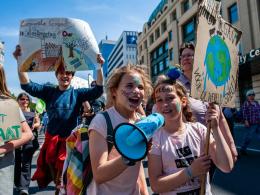European Economic
and Social Committee
Frans Timmermans meets European youth leaders to kick off the Youth Climate and Sustainability Round Tables
The European Economic and Social Committee (EESC) opinion on structured youth engagement on climate and sustainability in the EU decision-making process is gaining momentum. When adopted in September 2020, it proposed, among other recommendations, the establishment of a Youth Climate and Sustainability Round Table, to be hosted by the EESC in conjunction with the European Commission, European Parliament and youth organisations.
The Commission welcomed the initiative as a useful tool to strengthen the EESC's consultative role and give the younger generation the possibility to share its views on the European Green Deal. Less than one year later, the first meeting with 11 youth representatives kicked off on 13 July 2021, attended by Commission Executive Vice-President Frans Timmermans.
There are already some mechanisms at EU level that bring together young people and EU representatives. However, Youth Climate and Sustainability Round Tables will offer a new and unique approach, as they will formally give young people a seat at the table at institutional level and provide the building blocks for structured, meaningful youth engagement in the EU decision-making process by transforming youth proposals into tangible action.
As in any bargaining dialogue, I encourage young people to place the bar as high as possible in order to push decision-makers to adopt more ambitious climate policies, so that in the end, both can meet somewhere in the middle
, underlined Peter Schmidt, President of the EESC Section for Agriculture, Rural Development and Environment.
Thanks to you, the sense of urgency in our population is greater. That has also been increased by what we see happening around us. People are willing to contribute, but only if the burden is distributed in a fair way. Whatever we do, it has to be a socially just transition. We all have to work hard without expecting it to be for our own benefit, but rather for that of future generations. Some of you may think that we are not doing enough, but I promise I'm pushing as far as I can, and hopefully we can find some common ground to fight the good fight
, emphasised Vice-President Timmermans.
During the meeting, the young representatives presented Mr. Timmermans with a paper containing a twofold approach. On the one hand, on structure: how these round tables will work in the future. On the other hand, on specific proposals: relating to the EU economic system, including the EU’s management of natural resources and progress indicators.
The paper was initiated by Generation Climate Europe and the European Youth Forum, with the collaboration of the EESC and young European Union, Albanian, Brazilian and Nigerian activists. It was finalised with contributions from all the participants in this first event.
Engagement, diversity and empowerment
Youth Climate and Sustainability Round Tables have three main goals, stressed Agata Meysner, Director of Generation Climate Europe, when giving a presentation on the structure of the round tables. These goals are to:
- serve as a meaningful youth engagement mechanism in EU decision-making processes
- bring together diverse voices from young people
- empower young people to become climate advocates.
The idea is that they take place every three months, with the possibility of holding further meetings, if urgency so dictates.
The round tables will be facilitated by various European Commissioners working on climate and sustainability matters, with two meetings a year facilitated by Mr Timmermans.
Biliana Sirakova, EU Youth Coordinator (a post recently created – in June 2021 – to reinforce cross-sectorial cooperation and knowledge-sharing in the field of youth amongst European Commission services), will support this process by coordinating and liaising with different DGs.
All these meetings will be attended by a climate scientist to provide a scientific approach to the recommendations put forward and to back up the proposals with scientific evidence if needed.
Prof. Stefan Rahmstorf, Head of Earth System Analysis at the Potsdam Institute for Climate Impact Research (PIK), assumed this role at the first meeting. Commissioner Timmermans has clearly emphasised the urgency of the climate crisis. The positive news is that we can still stop the warming at 1.5 degrees, as was agreed in Paris, if we reduce emissions fast enough to bend the curve. The European 55% reduction goal by 2030 is a big step in the right direction. But if we all reduce emissions by the same amount, we will not make it … Climate justice implies that the well-developed industrialised nations have a greater responsibility to reduce emissions faster than the global average.
From a conference of words into conference of actions
What were the specific proposals addressed to the Commission at this first meeting?
Jan Mayrhofer, Senior Policy Officer from the European Youth Forum, presented the first three proposals, while pointing out that the ultimate goal of the round tables was not to talk, but to act. The proposals include:
- starting a discussion at EU level on the topic of over-consumption
- introducing science-based binding targets for a material footprint reduction to keep consumption levels within planetary boundaries; multiple targets should be set for 2030, 2040 and 2050 against a baseline scenario
- adopting EU legislation to ban planned obsolescence, linked to the right to repair.
Cillian Lohan, EESC Vice-President concluded: The EU urgently needs youth's innovative and ambitious approach to designing our future. This is a once-in-a-generation opportunity to redress systemic inequalities and transition away from unsustainable practices. However, young people need support. The ecosystem of activism needs encouragement, nourishing, and real space in the EU policy arena. Spaces for dialogue are only valuable if they are followed by action. Let's do it!

